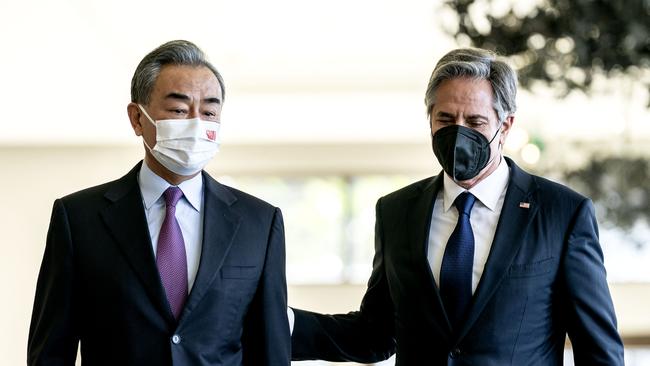Chinese FM Wang Yi warns ASEAN about ‘law of the jungle’
Beijing’s top envoy launched a subtle swipe to the Quad partnership between the US, Japan, India and Australia.

Chinese Foreign Minister Wang Yi told Southeast Asians that China and ASEAN should insulate the region from “geopolitical calculations and the trap of the law of the jungle” on Monday.
Mr Wang was in Jakarta as part of a Southeast Asia tour that also included Myanmar, the Philippines and Malaysia, to bolster Beijing’s influence in the region.
Speaking to the diplomatic community at the ASEAN Secretariat in Jakarta, he said there were different trends in the Asia-Pacific region, one that advocated “open regionalism through multilateralism” and the other that promoted “the obsolete Cold War mentality and closed group politics that classifies countries in the region based on their values”.
“We should uphold true regional co-operation that unites countries within the region and remains open to countries outside, and reject the kind of fake regional co-operation that keeps a certain country out and targets a certain side,” he said in a subtle swipe to the Quad partnership between the US, Japan, India and Australia, widely considered as a move to contain China’s rise.
His comments came after Mr Wang met Australian Foreign Minister Penny Wong on the sidelines of the G20 summit in Bali on Friday – the first meeting between the two nations’ foreign ministers in almost three years.
Mr Wang issued Senator Wong a four-point list of actions Australia must take to get the relationship “back on track” and said the Coalition was to blame for Beijing and Canberra’s spectacular bilateral breakdown.
Mr Wang insisted that the Asia-Pacific region was big enough for all regional countries to pursue their development and promote common development, touting close co-operation between China and ASEAN, including on trade and infrastructure.
China and ASEAN are each others’ biggest trading partners and most member states participate in Beijing’s Belt and Road Initiative. Despite their close economic ties, China and ASEAN have struggled over two decades to agree on a set of guidelines to govern safe conduct in the South China Sea, where China, Taiwan, Malaysia, Brunei, Vietnam and the Philippines have overlapping claims. China made the biggest claim based on “historic rights” that was invalidated by a 2016 international arbitration ruling, which Beijing rejected and instead shored up its military presence in the reefs in the world’s busiest maritime trade routes.
Concerns about China’s behaviour in the South China Sea were among the issues raised by US Secretary of State Antony Blinken when he met with Mr Wang in a five-hour meeting in Bali over the weekend.
The top diplomats of the two superpowers also discussed how they could manage their increasingly tense rivalry, as the US reiterated concerns over Beijing’s “increasingly provocative rhetoric and activity” toward Taiwan, as well as issues in Hong Kong, Tibet and Xinjiang. “None of these are easy topics. But the US always seeks to be a consistent voice on human rights and fundamental freedoms, not to stand against China or any other country, but to help advance peace, security, and human dignity,” Mr Blinken said, adding Washington wanted to keep open its channels of communication with Beijing.



To join the conversation, please log in. Don't have an account? Register
Join the conversation, you are commenting as Logout